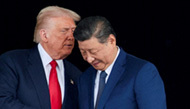▶ Turning inward after a lesson in the risks of cross-border lending.
VIENNA - Herbert Stepic, an Austrian banker, and Laszlo Seres, a Hungarian entrepreneur, have never met, but they are tied together by 20 years of business, tens of millions of dollars of debt and the dream of borderless prosperity made possible by a united Europe.
Now they are struggling to nurse their businesses through the economic downturn. Europe, which appeared so tightly bound during the boom years, has left them to find solutions to the financial crisis on their own.
The drive toward European unity required big doses of both political and financial capital, with Western European banks showering cash on Eastern European entrepreneurs like Mr. Seres, who used the money to build hundreds of square meters of office space for a booming Budapest, Hungary’s capital.
Mr. Seres is just one of Mr. Stepic’s 15 million customers at the huge bank Raiffeisen International, served by some 3,200 branches across Eastern Europe.
This eastward expansion seemed for years an inexorable and predictable process, with membership in the European Union followed by entry into the euro currency zone.
But as money from the West fueled a debtladen binge in the East, that grand vision may have blinded investors to the risks of cross-border, cross-currency lending. As the financial crisis struck, Mr. Stepic’s bank, like many in Austria, found its loan portfolio deteriorating alarmingly. Meanwhile, Mr. Seres was forced into a mad scramble for cash to try to save his real estate empire. He pulled $400,000 from his own savings to keep his latest development from going bust.
“For more than a month I hardly slept,” Mr. Seres said of the period at the height of the financial crisis when he feared he might not be able to make his payments on time.
Today, the aggressive lending for ambitious new projects has given way to a slow, painful unwinding. From Stockholm and Milan to Riga, Latvia and Sofia, businessmen on the front lines of integration had hoped that the European Union’s executive body in Brussels and the region’s central bank would put together a bold financial rescue and stimulus package to stabilize banks and cushion the severe slump in the East, especially in Hungary.
The World Bank’s president, Robert B. Zoellick, joined Austrian officials in calling for more assistance from Brussels to stabilize the region.
Instead, the leaders of the wealthier nations of Western Europe, who had welcomed their Eastern neighbors into institutions like NATO and the European Union, looked inward as the crisis worsened, rushing to protect their own companies and banks but resisting most pleas to save jobs or shore up banks elsewhere.
“We are not fighting against bad will. They are simply unable and not prepared to change the normal pattern,” Mr. Stepic, the banker, said of European leaders earlier this summer. “The main thing is that we don’t make geopolitical mistakes, that something that we all have been fighting for, for 50 years, to create a united Europe, is now forgotten suddenly.”
The countries that use the euro chose instead to go into what Adam S. Posen, the deputy director of the Peterson Institute for International Economics in Washington, called a “defensive crouch” to protect the euro, which some worried would weaken if governments piled up debt to bail out troubled banks or other companies. Mr. Posen called that a short-sighted approach that ignored the financial bonds between Europe’s constituent regions. “Failure to respond to the financial crisis in Eastern Europe is itself the greatest threat to the future growth and stability of the euro area,” Mr. Posen said.
Mr. Stepic said that 20 years ago he first began pushing for his bank, Raiffeisen Zentralbank, to capitalize on the crumbling of communism. The cold war years had relegated Austria to relative backwater status. But Raiffeisen could now expand by founding new banks in Poland, Slovakia, the Czech Republic, Bulgaria and Croatia as well as Hungary.
The time was “a unique chance for Austria, a unique chance for Europe, a unique chance for our own organization,” said Mr. Stepic, deputy chairman at Raiffeisen Zentralbank, Raiffeisen International’s parent company.
That opportunity was presented to businessmen like Mr. Seres. In 1998 he borrowed about $2 million from Raiffeisen to finance new office building projects. “I’m a very conservative businessman,” he said. “But you know if you get into a big real estate dealing you cannot do it without a bank.”
Such ties proliferated around the region, as Europe became reconnected. Swedish banks made significant investments in the Baltics. French, Italian and Belgian banks moved into the former Warsaw Pact. Austrian banks were in the forefront.
In 2004, the European Union celebrated the entry of 10 new members, including Hungary and seven other former Communist states of Eastern Europe, followed in 2007 by Romania and Bulgaria.
But the former Eastern Bloc, so reliant on financing from abroad, suddenly began to look shaky last year. The cash that had streamed into Eastern Europe was abruptly pulled out.
“Suddenly the banks stopped lending money,” Mr. Seres said.
In countries like France and Germany, talk of severe devaluations in Eastern European currencies has led to protectionist policies. The European Central Bank, at the same time, is refusing to relax the stringent criteria for joining the monetary union.
Mr. Stepic’s bank, Raiffeisen International, has seen the value of loans more than 90 days overdue nearly triple to almost $5.2 billion at the end of the second quarter in June compared with nearly $2 billion a year earlier.
Mr. Seres shored up his own capital position by selling 30 percent of one real estate venture. “Nobody knows what is the value on the market, because no transactions are on the market,” he said. “Nobody buys buildings now. We call it ‘sit out’ in Hungary. You sit and wait. Wait and see.”
스마터리빙
more [ 건강]
[ 건강]이제 혈관 건강도 챙기자!
[현대해운]우리 눈에 보이지 않기 때문에 혈관 건강을 챙기는 것은 결코 쉽지 않은데요. 여러분은 혈관 건강을 유지하기 위해 어떤 노력을 하시나요?
 [ 건강]
[ 건강]내 몸이 건강해지는 과일궁합
 [ 라이프]
[ 라이프]벌레야 물럿거라! 천연 해충제 만들기
 [ 건강]
[ 건강]혈압 낮추는데 좋은 식품
[현대해운]혈관 건강은 주로 노화가 진행되면서 지켜야 할 문제라고 인식되어 왔습니다. 최근 생활 패턴과 식생활의 변화로 혈관의 노화 진행이 빨라지고
사람·사람들
more많이 본 기사
- 뉴저지서 헬기 2대 공중 충돌… “최소 1명 사망”
- 국힘, 이혜훈 발탁에 최고위 열어 ‘제명’… “배신” 비난 쏟아져
- ‘정신건강 위험’ 비판받은 오픈AI, AI 안전 책임자 다시 모집
- 트럼프 “종전협상 마지막 단계”…젤렌스키 “신속한 평화 오길”
- “내년 미중관계 4대 화약고는 대만·콩·수출통제·군사굴기”
- ‘친형 구속’ 박수홍, 그 다음은 ‘198억 손해배상’
- ‘정계은퇴선언’ 펠로시 “중간선거서 민주당이 하원 다수당 될것”
- “케데헌이 없애준 장벽… “ WSJ ‘미국인 사로잡은 K팝’ 조명
- 충격 진단 “네이마르 이미 끝났다, 몸 심각하게 손상”... ‘식단 문제·훈련 부족’ 지적 “월드컵? 너무 늦었다”
- 중도보수 중량급 인사 중용…李대통령 ‘실용주의 용인술’ 재부각
- 美서 스마트폰 ‘부모통제’ 기능으로 납치 청소년 구조
- 트럼프, 젤렌스키와 회동 앞서 “푸틴과 생산적인 통화했다”
- 트럼프, 태국-캄보디아 휴전에 “미국이 기여…유엔, 도움안돼”
- “13초만에 수백만 달러 매출” 방탄소년단 뷔 3분 라이브 방송이 만든 크리스마스의 기적
- “지금은 하늘에... 아빠가 뛰던 곳이란다” 故 조타 아들 둘, 반 다이크 ‘손 꼭 붙잡고’ 안필드 찾았다
- 러시아 “대만해협 긴장 고조시 중국 지지…대만은 中 일부”
- 뉴욕에 3년만에 최대 폭설…이틀째 항공·도로 대란
- 삼보일배·108배…집회도 대통령 따라 다시 청와대 앞으로
- ‘180일 질주’ 김건희특검 수사결과 발표…20명 구속·66명 기소
- 이이경·조세호 다 떠나고..유재석 곁엔 결국 ‘무도’ 인연이었다
- 황하나, 남편 사망→캄보디아서 남친과 출산..귀국 후 구속 ‘파란만장’
- ‘AI 조작 번복’ 폭로자 vs ‘유재석 패싱’ 이이경..하차 잔혹사로 번진 사생활 논란 [2025 연말결산]
- 180일간 김건희만 판 특검 오늘 수사 종료…’V0’ 단죄 성과
- 태국-캄보디아, ‘101명 사망’ 교전 20일만에 휴전
- ‘6·3 大戰’ 앞둔 대통령실 참모들 시선집중…10여명 출마 거론
- ‘파친코’ 이민진 작가 “맘다니 뉴욕시장, 긍정적 변화 기대”
- 올해 美 기업 파산신청 증가… “관세·고물가·고금리 원인”
- 쿠팡 김범석, 30~31일(한국시간) 연석청문회 또 불출석 의사… “일정 있어”
- 캐나다, 우크라에 18억달러대 추가 재정 지원키로
- NASA 신임 국장 “美, 트럼프 임기내 달에 다시 갈것”
- 보수 야당 “의원직 사퇴하고 법심판 … 1
- “개인 선정은 SON이 유일?” 손흥민, 축구계 8대 기적 선정이 더 대단한 이유 “퀴라소 월드컵 진출보다 멋져”
- “트럼프, 29일 네타냐후 회담서 가자휴전 이행문제 제기키로”
- 오윤아 “子, 학교 떨어져 잘못 키웠나..방치 했나 싶어 눈물”
- ‘통일교 자금관리’ 한학자 前비서실장 재소환…피의자 전환
- 뉴욕시 폭설에 항공기 수천편 취소·지연 사태
- IS 확실했나…트럼프 ‘성탄절 나이지… 1
- 젤렌스키 미국행… “레드라인 있지만 타협점 찾을 수 있어”
- “올해 최고 주목받은 테크 거물은 머스크 아닌 래리 엘리슨”
- ‘이강달’ 강태오, 로코 달인은 다르다.. “김세정도 눈빛 좋다고”
- 국힘 “신천지로 통일교 특검 물타기 … 2
- 마지막 토요일도 도심 집회… “내란 … 6
- 여야, ‘통일교·종합 특검’ 정면충돌… 2
- “2025년 높이뛰기는 우상혁과 커의 무대” 세계육상연맹 조명... 우상혁도 “커와 계속 경쟁해야 해”
- “SD서 최고 활약 김하성, 2024시즌만큼만 쳐줘도 ATL 3승 더한다” ESPN 극찬
- 쿠팡 ‘정부 반박’ 영문성명 미묘한 … 1
- “솔직히 자신은 없죠” 3루수 GG 송성문, 유격수도 아닌 외야라니... 생존 본능 발동할까
- 특검, ‘로저비비에’ 김기현 부부 기… 1
- 러, 젤렌스키 미국행 앞 대규모 공습…우크라도 러에 드론 공격 이전 다음
1/5지식톡

-
 미 육군 사관학교 West Poin…
0
미 육군 사관학교 West Poin…
0https://youtu.be/SxD8cEhNV6Q연락처:wpkapca@gmail.comJohn Choi: 714-716-6414West Point 합격증을 받으셨나요?미 육군사관학교 West Point 학부모 모…
-
 ☝️해외에서도 가능한 한국어 선생님…
0
☝️해외에서도 가능한 한국어 선생님…
0이 영상 하나면 충분합니다!♥️상담신청문의♥️☝️ 문의 폭주로 '선착순 상담'만 진행합니다.☎️ : 02-6213-9094✨카카오톡ID : @GOODEDU77 (@골뱅이 꼭 붙여주셔야합니다…
-
 테슬라 자동차 시트커버 장착
0
테슬라 자동차 시트커버 장착
0테슬라 시트커버, 사놓고 아직 못 씌우셨죠?장착이 생각보다 쉽지 않습니다.20년 경력 전문가에게 맡기세요 — 깔끔하고 딱 맞게 장착해드립니다!장착비용:앞좌석: $40뒷좌석: $60앞·뒷좌석 …
-
 식당용 부탄가스
0
식당용 부탄가스
0식당용 부탄가스 홀세일 합니다 로스앤젤레스 다운타운 픽업 가능 안녕 하세요?강아지 & 고양이 모든 애완동물 / 반려동물 식품 & 모든 애완동물/반려동물 관련 제품들 전문적으로 홀세일/취급하는 회사 입니다 100% …
-
 ACSL 국제 컴퓨터 과학 대회, …
0
ACSL 국제 컴퓨터 과학 대회, …
0웹사이트 : www.eduspot.co.kr 카카오톡 상담하기 : https://pf.kakao.com/_BEQWxb블로그 : https://blog.naver.com/eduspotmain안녕하세요, 에듀스팟입니다…
케이타운 1번가
오늘의 1면
오피니언

새해 더 중요해지는 노동법 준수

연말연시, 안전하고 차분하게
 캐슬린 파커 워싱턴포스트 칼럼니스트
캐슬린 파커 워싱턴포스트 칼럼니스트 [캐슬린 파커 칼럼] 지미 라이의 마지막 희망
 유경재 나성북부교회 담임목사
유경재 나성북부교회 담임목사 [한국춘추] 미국의 힘
 전병두 서북미수필가협회 회원
전병두 서북미수필가협회 회원 [금요단상] 비자 발급
 박일근 / 한국일보 수석논설위원
박일근 / 한국일보 수석논설위원 [지평선] 스님의 주례사
 신상철 / 고려대 고고미술사학과 교수
신상철 / 고려대 고고미술사학과 교수 [미술 다시보기] 신의 모습을 닮고자 한 예술가
 스티브 강 전 한인민주당협회 회장
스티브 강 전 한인민주당협회 회장 [스티브 강 ‘인사이드 미국’] 2026 중간선거: 트럼프 지지율 하락이 말해주는 것
 김홍일 케이유니콘인베스트먼트 대표
김홍일 케이유니콘인베스트먼트 대표 [기고] 안정의 기준은 어떻게 제도가 되었나
1/3지사별 뉴스

물류거점창고에 불체자 8만명 수용 추진
도널드 트럼프 행정부가 이민자 구금·추방을 효율화하기 위해 전국 물류거점 창고에 8만명 규모의 수용시설 확보를 추진한다고 24일 워싱턴 포스트…
‘학자금 상환’ 안하면 임금압류

“온 세상에 희망·평화의 빛 스며들길”
가자지구와 우크라이나에서의 전쟁, 고립과 불평등으로 세상이 어지러운 가운데 워싱턴 지역 각급 한인교회와 성당들이 성탄절을 맞아 일제히 예배와 …
“연말은 스트레스·새해 결심은 없다”

“올해 최고 주목받은 테크 거물은 머스크 아닌 래리 엘리슨”
올해 미국에서 가장 주목받은 기술업계 거물은 일론 머스크 테슬라 최고경영자(CEO)가 아닌 래리 엘리슨 오라클 창업자·회장이라고 블룸버그 통신…
[새해부터 이렇게 달라진다] 최저임금 또 오르고… 유급 병가는 더 확대

오늘 하루 이 창 열지 않음 닫기 





















































.png)


댓글 안에 당신의 성숙함도 담아 주세요.
'오늘의 한마디'는 기사에 대하여 자신의 생각을 말하고 남의 생각을 들으며 서로 다양한 의견을 나누는 공간입니다. 그러나 간혹 불건전한 내용을 올리시는 분들이 계셔서 건전한 인터넷문화 정착을 위해 아래와 같은 운영원칙을 적용합니다.
자체 모니터링을 통해 아래에 해당하는 내용이 포함된 댓글이 발견되면 예고없이 삭제 조치를 하겠습니다.
불건전한 댓글을 올리거나, 이름에 비속어 및 상대방의 불쾌감을 주는 단어를 사용, 유명인 또는 특정 일반인을 사칭하는 경우 이용에 대한 차단 제재를 받을 수 있습니다. 차단될 경우, 일주일간 댓글을 달수 없게 됩니다.
명예훼손, 개인정보 유출, 욕설 등 법률에 위반되는 댓글은 관계 법령에 의거 민형사상 처벌을 받을 수 있으니 이용에 주의를 부탁드립니다.
Close
x